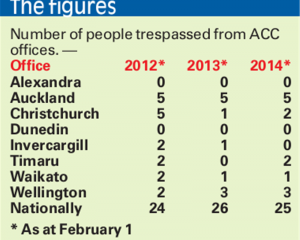"Ignore this at your peril," he warned this week.
The names of more than 470 Otago ACC claimants were on a list of 6725 people mistakenly emailed to Auckland resident Bronwyn Pullar in a major privacy breach late last year.
Two recent independent reports into the breach found "systemic failure" in ACC's privacy protection.
And one report, commissioned by the Privacy Commissioner, highlighted problems with the excessively broad nature of the ACC 167 consent form, granting ACC access to claimant medical information and other data.
ACC clients have been required to sign this form, or risk having their entitlements suspended.
The report's authors urge the ACC to pursue a "better practice review" of the form in "detailed consultation" with stakeholder groups.
And, in a recently-released ACC appeal judgement, Auckland District Court Judge Roderick Joyce took issue with ACC for insisting the form be signed when a previous case-by-case consent negotiated by the appellant had long been in place.
The judge upheld an appeal by Peter de Waal, whose cover for medical misadventure arising from surgery, as well as for a back injury and some other conditions, was suspended in 2009 for not signing the ACC form.
Judge Joyce acknowledged there had also been some faults in the way Mr de Waal's case had been advanced, but said ACC had taken a "disproportionate" and an "unfortunate, indeed, unreasonable" approach in requiring the form to be signed without giving him a chance to discuss the proposed change.
Mr Sara said ACC must heed "important messages" about the form, which many of his clients had been forced to sign.
The appeal involved an Auckland case but signalled a significant change of direction by the courts, and ACC could change the form "in a day" if it wished to do so, he said.
Asked by the ODT if the corporation was still requiring the form to be signed by claimants, ACC officials said the corporation had commissioned a work programme to implement all the recommendations identified in the Independent Review of ACC Privacy and Security of Information report.
"Reviewing the ACC 167 consent form is part of this programme," they said.
Good progress was being made in implementing the recommendations, but it would take time to complete them all, as they included changes to governance, strategy, systems and culture, they said.
Dunedin ACC campaigner Denise Powell said ACC's earlier decision to accept all the report's recommendations had been viewed positively by the public.
However, for ACC to insist everyone should still sign the form would undermine the goodwill ACC Minister Judith was requiring ACC to re-establish with the public.
ACC could lose "an awful lot of credibility" unless it adopted a more flexible approach, she said.





